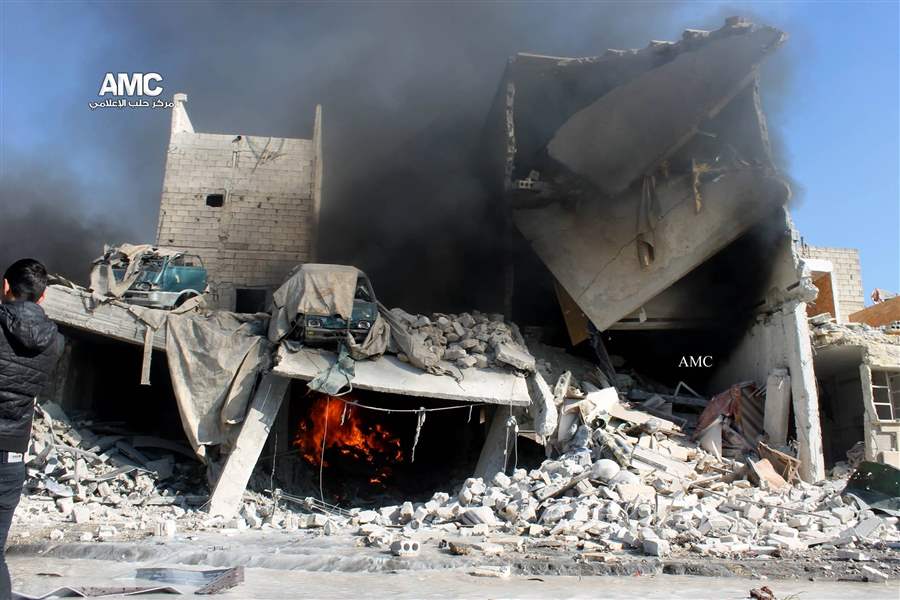
Activists: Syrian aircraft bomb the north, 45 dead
12/23/2013
This citizen journalism image provided by Aleppo Media Center, AMC, which has been authenticated based on its contents and other AP reporting, shows a destroyed building after a Syrian aircraft pummeled masaken hanano, an opposition neighborhood in the northern city of Aleppo, Syria, Sunday, Dec. 22, 2013. Syrian aircraft pummeled an opposition neighborhood in the northern city of Aleppo on Sunday, killing scores and extending the government's furious aerial bombardment of the rebel-held half of the divided city to an eighth consecutive day. (AP Photo/Aleppo Media Center AMC)
ASSOCIATED PRESS
BEIRUT — Government forces widened a bombing campaign in rebel-held areas of northern Syria today, striking the northern city of Aleppo and a town on the Turkish border in raids that left an estimated 45 people dead, activists said.
The attack on the border town of Azaz was the latest attack using powerful but inaccurate “barrel bombs” on the Aleppo region, said an activist who goes by the name of Abu al-Hassan Marea. He said residents in the town told him that 15 people were killed in the strike. Another activist group, the Local Coordination Committees, gave the same death toll.
The Azaz attack suggests the government is expanding its range of targets a week after it began an unusually heavy air offensive against Aleppo on Dec. 15, dropping barrel bombs on rebel-held areas from helicopters. Aleppo, Syria’s largest city, is divided into government-and-rebel-ruled areas.
The Britain-based Syrian Observatory for Human Rights reported that multiple air raids on the Aleppo neighborhoods of Sukkari, Maadi, Marjeh and Nairab left at least 30 people including 12 children dead today. It said the death toll could rise as there are many people who were seriously wounded. On Sunday, 65 were killed near an Aleppo marketplace in one of the bloodiest days of the air campaign, according to activists.
Rami Abdurrahman, who heads the Observatory, said earlier in the day that air raids on the northern province of Aleppo have killed at least 301 people including 87 children, 30 women and nearly 30 opposition fighters since mid-December. That figure did not include those reported killed today. The aid group Doctors Without borders has said the bombs killed at least 189 people and wounded 879 in the first four days alone.
The main Western-backed Syrian opposition group, the Syrian National Coalition, warned that if the bombing campaign against Aleppo continues it will not take part in U.N.-sponsored peace talks planned for Jan. 22 in Switzerland. A coalition statement quoted the group’s Secretary General Badr Jamous as saying they will boycott the talks in case the air raids do not stop.
Barrel bombs are crude devices filled with explosives and fuel that are wildly inaccurate — often landing near schools and market places, causing massive damage on impact.
The government has not commented on the use of the crude weapons, nor on the intensified strikes over Aleppo. But the timing suggests that President Bashar Assad could be trying to strengthen his position a month ahead of planned peace talks in Switzerland.
In the capital Damascus, Assad received an Australian delegation telling them his government is fighting extremists who might strike anywhere in the world, the state media said. SANA said the delegation included academics, researchers and activists.
“What is happening in Syria and the region in general affects the whole world,” Syria’s state news agency SANA quoted Assad as telling the delegation. “The country is facing fanatic takfiri ideology that has no borders. It is an epidemic that could strike anytime and anywhere.” The term “takfiri” is usually applied to hard-liners who consider other Muslims to be infidels.
Assad said in the past that fighters from more than 80 countries have come to Syria to fight against his forces. The president says his army is fighting “terrorists” backed by foreign states.
In Britain, Foreign Secretary William Hague said in a statement: “I am deeply concerned at the escalating level of violence in Syria. I condemn the use of brutal and indiscriminate weapons in densely-populated civilian areas, such as we have seen in Aleppo in recent days.”
In Lebanon, officials close to Hezbollah said members of the militant group ambushed a number of “Islamic” fighters in a rugged mountainous region on the edge of the northeastern Lebanese border town of Nahleh. The officials, who spoke on condition of anonymity because they were not authorized to speak publicly, said the Saturday ambush left one Hezbollah fighter dead as well as several Syrian opposition fighters.
The officials did not have an exact figure of the militants who were killed, nor specify the group.
Lebanese security officials confirmed there was a one-hour clash in the border area known as Wadi al-Jamala on Saturday but had no word on casualties. The officials, who spoke on condition of anonymity in line with regulations, said clashes between Hezbollah and Syrian opposition fighters are common in the area.
Earlier this year, Hezbollah openly started taking part in Syria’s civil war fighting along Assad’s forces. Attacks by Syrian opposition fighters on Lebanese towns and villages have not been uncommon.
On Tuesday, a car bomb packed with explosives detonated near a Hezbollah base in eastern Lebanon causing several casualties.